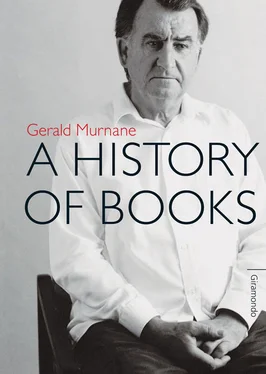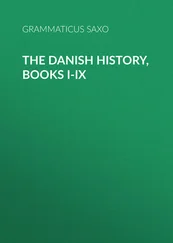Each of the four previous paragraphs reports details of a central image surrounded by a cluster of lesser images that had arisen from several sentences of one or another piece of fiction. In none of those paragraphs are words quoted from any piece of fiction. For as long as the man who was aware of those images was aware of them, he was unable to quote in his mind from any of the sentences that had caused those images to arise.
This continued to be a disappointment to the man, whatever his name was. In gloomy moments, he was ready to suppose that he had argued as a teacher of fiction to no purpose when he had argued that fiction was made up of sentences and sentences alone. In those gloomy moments, he was ready to suppose that he had got from the several thousand pieces of fiction he had taught his students to write only a cluster of images such as he might have got if his hundreds of students, instead of writing fiction, had met for a few weeks in his presence and had talked about their memories and imaginings.
But the man could always put an end to his gloom by looking along the far-reaching home-straight of the vast racecourse in his mind and observing a fifth contender for the Gold Cup of Remembered Fiction. As a racing commentator might have said, this contender was going strongly — as strongly as anything else in the field. The man in whose mind this fifth contender had arisen and who could not keep himself from trying to foresee the outcome of any race-in-progress, this man foresaw that the finish might be, in the language of racing commentators, desperately close, but he foresaw that the fifth contender would be the winner at last.
The fifth contender was a sentence: the opening sentence of a piece of fiction. A few vague images hung about the man’s mind whenever he heard the sentence in his mind, but they meant little to him. The man was not even sure whether the images had arisen when he had first read the fiction that followed on from the opening sentence or whether he had imagined them, so to speak, at a much later date. The man seemed to have forgotten almost all of the fiction except for the opening sentence: The boy’s name was David .
Whatever else the man might have forgotten from his experience of reading the fiction that followed on from the sentence just above, he had not forgotten the exhilaration that he had felt as he read the sentence for the first time; and he recalled the substance of the long message that he had written to the author of the fiction as part of his, the teacher’s, assessment of the piece; and he recalled the substance of the comments that he had later made to the class where the fiction was read and discussed.
The boy’s name was David . The man, whatever his name was, had known, as soon as he had read that sentence, that the boy’s name had not been David. At the same time, the man had not been fool enough to suppose that the name of the boy had been the same as the name of the author of the fiction, whatever his name had been. The man had understood that the man who had written the sentence understood that to write such a sentence was to lay claim to a level of truth that no historian and no biographer could ever lay claim to. There was never a boy named David, the writer of the fiction might as well have written, but if you, the Reader, and I, the Writer, can agree that there might have been such a boy so named, then I undertake to tell you what you could never otherwise have learned about any boy of any name.
This and much more the man, whatever his name was, had understood from his first reading of the first sentence of the piece of fiction by a man whose name he soon afterwards forgot. And in his comments on that sentence the man, so he had thought at the time and for long afterwards, had come as close as he would ever come to explaining the peculiar value of fiction and why persons such as himself devoted much of their lives to the writing and the reading of fiction.
During a lifetime of watching horse-races or televised images of horse-races and of listening to radio broadcasts of horse-races, the man mentioned often in this fiction but never named had seen a comparatively small number of a sort of finish in which the eventual winner had not been considered even a likely placegetter a short distance from the winning post. Racing commentators described such a winner as having come from nowhere or from the clouds or from out of the blue. The man liked this sort of finish above all other sorts. Even if he had lost money on one of the beaten horses in such a finish, he could later appreciate the complex interplay of feelings that the last part of the race and, at the very last, the finish of the race had caused to occur in the minds of the persons interested in the race.
Finishes such as those described just above were rare enough in races over shorter distances and almost unheard of in long-distance races. In those races, the leading few usually remained in the lead during the last phase of the race, the rest having tired and fallen far behind. But the man of this fiction had seen occasionally a group of leaders unexpectedly tire and falter near the end, and an unthought-of horse arrive ahead of them. And towards the end of the race mentioned most often in this piece of fiction, the man became aware of the arrival on the scene, as a racing commentator might have said, of a previously unthought-of contender.
Perhaps ten years before the fictional time when this piece of fiction began, the man most often mentioned in this piece had been in his office on a cold, cloudy afternoon during the mid-year break between the first and second semester. Few students were on the campus. This was one of the few periods of the year when the man could sometimes read or write fiction for several hours without interruption. Then, while he was reading or writing, the man was visited, as he was liable to be visited at any time during the year, by a person who had heard about his course and wanted to learn more about it before applying to enrol.
The person visiting was a young woman. Something about her made him feel warmly towards her at once, and what she told him made him feel even more so, but he tried to deal with her in the same calm and courteous way in which he tried to deal with all his students. He and the young woman talked for perhaps twenty minutes, after which time they farewelled each other and the young woman went away. At the time when the man supposed that an important race in his mind was approaching its end, he had never seen the young woman or had any communication with her since the cold and cloudy afternoon when she had visited him in his office, perhaps fifteen years before.
Most of what the young woman had told the man is no part of this piece of fiction. The reader needs to know only that the young woman had not long before been disowned, as she expressed it, by her parents because she would not follow some or another career or profession. She had then left her parents’ house in a northern state of Australia and had moved to Tasmania and had found employment as an assistant to the chef in a fashionable restaurant. Only recently, so she explained to the man in his office, the chef in the fashionable restaurant, together with his wife, had invited her to join them in establishing a restaurant of their own with all three of them as partners. The young woman had been flattered by this offer, so she told the man in his office, but she had not yet accepted it. She was unable to think of herself as having any career or profession. For some years past, she had wanted to devote herself to writing fiction. She had heard of the fiction-writing course conducted by the man, and she had travelled from Tasmania on that cold and cloudy afternoon to learn more about the course and to help her chances of gaining entry to the course.
Читать дальше












